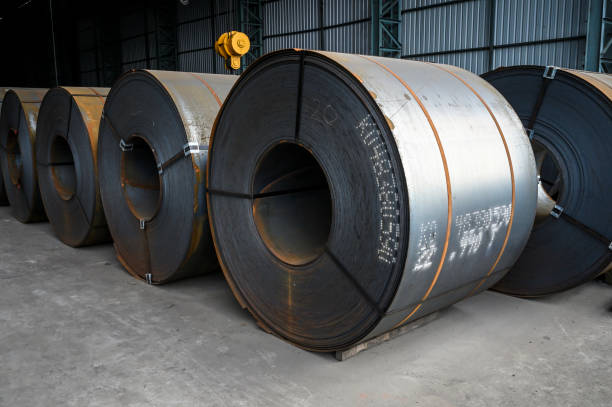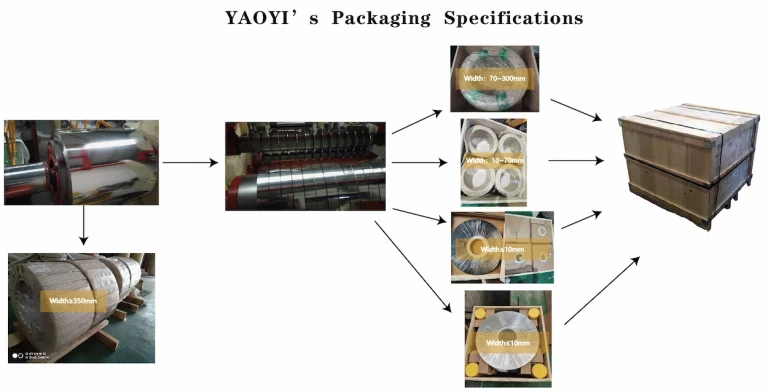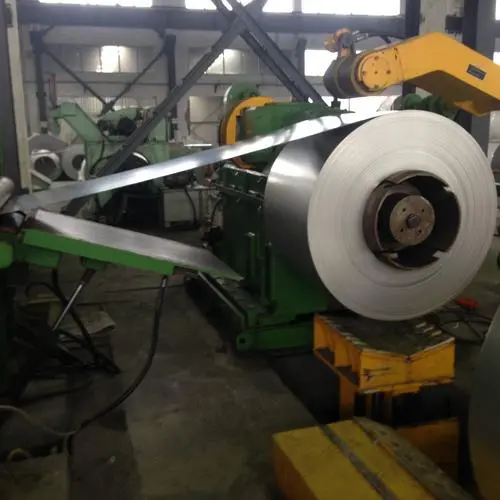Myriad AISI 420 stainless steel is a stainless steel that meets AISI standards. The production process has an ISO9001 management system to ensure the quality of the AISI 420 ss you purchase.
Although austenitic steel is more widely used compared to martensitic steel, this does not mean that martensitic steel like the AISI 420 is not worth considering. It has its pros and cons and specific functions that austenitic steel is not capable of withstanding or performing and vice versa.

Besides the 0.05mm stainless steel foil, you may need to purchase other 304 stainless steel products from China, please contact us if you have any questions.

The meaning of AISI was found back in 1908, and it stands for American Iron and Steel Institute. AISI was one of the companies that contributed a lot of effort together with the Society of Automotive Engineering (SAE) in standardizing the numbering system for steel we have today.
Stainless Steel 316 And 316L Graded By The AISI System
“Martensitic” refers to a solid crystalline structure. In an industrial aspect, martensitic steel is one of the types of stainless steel that is corrosion-resistant.
But what makes it special? AISI 304, AISI 316, AISI 321, and other grades are also corrosion-resistant.
For martensitic steel like the AISI 420, this stainless can both have a low or high percentage of Carbon. Martensitic steel also contains a solid solution of iron, which contributes to its toughness in tensile strength.
Try for free information about the Aisi 304 stainless steel : the best you can find & purchase – Yaoyi
The AISI steels mentioned above (except the AISI 420) are all austenitic stainless steel. They are more used in industrial applications than martensitic steel.
The chemical components of austenitic steel are primarily composed of high chromium content and nickel. These elements give austenitic steel a stronger protective layer against corrosion.
Read more:difference between Stainless Steel 316 and Stainless Steel 316l
The main differences between Austenitic steel and martensitic steel are their mechanical properties, chemical compositions, and heating treatment.
Martensitic steel can be heat-treated and hardened, but in terms of protective resistance, austenitic stainless steels are the superior choice.
Martensitic steels are used when hardness is critical.
The perfect examples of this are knives. Have you noticed its surface hardness creates a sharper edge or blade? That is because of that very reason.
AISI 316L & AISI 316: Everything You Need To Know – Yaoyi stainless steel
420 Stainless Steel is a stainless steel that has excellent hardenability and strength with great corrosion resistance properties that hold out against acidic and alkaline substances.
420 Stainless Steel is great for projects and applications that require good hardenability attributes. 420 Stainless Steel has a similar resistance to the AISI 410 but the 420 Stainless Steel is much stronger in terms of hardness.
Best AISI 321 stainless steel products are available- YAOYI Stainless Steel
AISI 420 offers outstanding ductility in its annealed condition. Moreover, it provides superb corrosion resistance as well when the metal is polished whether it is surface grounded or hardened. The 420 Stainless Steel has the highest hardness of 50 HRC (Rockwell C Scale) which is much more than other stainless steel grades with 12% of Chromium.
AISI 420 is commonly used for cutting instruments or cutlery but of course, it is not only limited to that as it can also be used for other important matters such as:
AISI 420 is great for surgical materials because of its hardenability and corrosion resistance. Ideal for cutting hard structures such as bones during critical operations.
It does not also rust, which means that it does not deteriorate which is good for the longevity of the material.
The same goes for dental equipment. Sharp mediums for extracting teeth and modifications are necessary, which is why 420 Stainless Steel is the right type of steel for the job.
They are very durable and their hardness easily handles dental procedures, and it is also worth mentioning that 420 Stainless Steel has great wear resistance of carbon steel.
Shear blades commonly use 420 Stainless Steel because this steel grade is very easy to sharpen, and it also has properties that keeps the blade from corroding. YAOYI provides budget-friendly quotes for your cutlery needs for your business.
Since the chemical composition of the 420 Stainless Steel contains formidable corrosion resistant properties, it is no surprise that they can be used for diesel engine pumps even in highly aggressive, non-chlorinated environments that can easily harm other steel grades.
It is not rare for 420 Stainless Steel to be used in needle valves since this grade is best suited for this application. Needle valves also need to be durable, which is why AISI 420 and other steel grades that have a high HRC, are perfect for needle valves.
ASTM A167: Composition, Properties, and Equivalent Grades – YAOYI
Below are the mechanical properties of 420 Stainless Steel. In this section, you will learn the technical aspects of AISI 420, which will give you a better understanding of why its durability is supreme.
For comparison of other steel grades, you may check YAOYI’s mechanical properties table.
If you did not know what steel grade means, here is the definition.
The definition of steel grade is to classify different types of steel by looking into its mechanical properties and chemical composition. Each type of steel grade is different from one another as it has its own unique elements and purposes.
For AISI 420, it is capable of having both high or low carbon content, and it has martensitic components.
Tensile strength is the resistance of steel to breaking under tension. Tensile strength plays a vital role in the flexibility or formability of the steel. For AISI 420 Stainless steel, it has a tensile strength of 665 PSI (Per square inch) in its annealed condition.
If you are not sure what tensile strength you should use for your projects, you can contact us by clicking/tapping here. YAOYI will guide you to what tensile strength is appropriate for your projects since the wrong tensile strength risks your project from breaking.
Yield strength is when steel is stressed by an amount that is less than it yields. This is also an important factor to determine a steel’s durability. Any steel that breaks easily under moderate tension is considered low steel grades that are not suited for big projects such as infrastructures.
In this case, the Yield Strength Minimum 0.2% offset (psi) of AISI 420 is 345, which means that it is capable of going under a large amount of stress without showing any signs of breaking or damage.
Some steels are capable of long stretches and this is important for their formability to be versatile. Steel elongation is the rate or percentage of how much the steel can stretch from its original length. AISI 420 has 11% Elongation in 50mm which is excellent for forming the steel into various shapes without breaking.
ASTM A240 Type 304: Properties, Pricing, and Applications – YAOYI
The AISI 420 has a lot of elements in its chemical composition with Chromium (12%-14%) and Carbon (0.16%-0.25%) having the highest content.
Below are the other elements that AISI 420 contains.
Each of these elements contributes an attribute to the AISI 420. However, it does not outperform the effects of chromium and carbon.
Grade 304 Stainless Steel Foil – YAOYI Stainless Steel
The 420 Stainless Steel is capable of withstanding extreme temperatures, which is why outdoor exposure to different weather conditions is no problem for the AISI 420.
This is because of its thermal properties. The properties are indicated below.
Its test method is ASTM 1461-13 with an as-built of 30 W/m°C which gives it incredible endurance to high temperatures.
For its specific heat capacity, with the same method of ASTM 1461-13 it has an as-built of 460 J/kg°C
How To Find The Right Stainless Steel Supplier – YAOYI Stainless Steel
In the AISI 400-range, many grades meet the minimum chromium requirements for those to be considered a food grade. 420 Stainless Steel and AISI 440 are both considered food-grade steels. This is the reason why 420 Stainless Steel can be used as kitchenware and knives.
Is 301 Stainless Steel Magnetic?
AISI 420 has exceptional hardenability. In fact, it is the upgraded version of the already-tough steel AISI 410. Similar to the AISI 410, the AISI 420 also contains 12% chromium, which is just the right amount to obtain corrosion resistant properties.
J2 Stainless Steel: A Complete & Thorough Guide
No, the highest grade of steel is the AISI 304, this type of steel has an incredibly high tensile strength of 621 MPa (90 ksi) with operating temperatures reaching up to about 870˚C.
In fact, AISI 304 is one of YAOYI’s best-selling stainless steel. It has superb corrosion resistance, and it can handle extreme temperatures.
However, when it comes to hardenability, the AISI 420 is the better option.
J3 Stainless Steel : A Complete Guide For Importers
AISI 420 is a martensitic type of steel that is capable of providing durability due to its high amount of hardenability properties similar to the AISI 410.
Although it has moderate corrosion resistance, it does have properties that make it magnetic in both its annealed and hardened state.
J4 stainless steel Food Grade : the best you can find & purchase.
420 Stainless Steel is safe and reliable when it comes to food applications. This is because 420 Stainless Steel is considered as a food-grade type of steel or “cutlery grade”. This alloy can be broken down in the process of sharpening with having their corrosion-resistance remain.
However, for extra corrosion resistance and high moisture uses, surgical steel is the best choice.
Stainless Steel AISI 316Ti (S31635) By The AISI System
Below are the advantages and disadvantages of 420 Stainless Steel. This section will help you make your purchase decision and give you the final verdict.
In case you are still confused after reading the article, YAOYI’s service team is one call away for the professional help you need.
Here are the key advantages the 420 Stainless Steel offers:
The AISI 420 has no problems whatsoever with scaling resistance at temperatures ranging up to 650°C. However, any further than that could damage the steel.
When it comes to corrosion resistance, the 420 Stainless Steel may not have the strongest resistance compared to common austenitic steels, but they are capable of protecting themselves with corrosion attacks.
In a hardened state, AISI 420 stainless steel is resistant to fresh water, acid, air, food, and alkalis. 420 Stainless Steel is designed to endure such elements for the best performance. However, the corrosion resistance will fall when it is in its annealed condition.
In fact, its corrosion resistance is lower than AISI 420, with a Chromium content of 17%
AISI 420 is great for various types of knives including carving knives, table knives, and so on. 420 Stainless Steel has a moderate corrosion resistance against food, but continuous exposure could lead to pitting corrosion which is something you should consider.
In its annealing stage, 420 Stainless Steel can be heated at temperatures ranging from 840°C to 900°C with a slow furnace burning at 600°C
For process annealing, 420 Stainless Steel can be annealed at 735°C to 785°C followed by air-cooling.
In terms of hardening, this process involves heating between temperatures 980°C to 1035°C, and once again followed by air cooling. It is important to keep this in mind that AISI 420 should not be tempered at temperatures between 425°C to 600°C.
420 Stainless Steel is surprisingly easy to weld. They are welded using welding rods coated with AISI 420 metals to gain strong joints. They are also pre-heated and post-heated during the process of this stage.
In its annealed state, 420 Stainless Steel is easy to machine. But when its hardness reaches 30 HRC, then that is a different story. It will be difficult to machine since 30 HRC is already hard.
AISI has its cons as well, but depending on what your purpose is, if what you expect matches the capabilities of 420 Stainless Steel, then it will be a good choice for you.
Here are the main disadvantages of 420 Stainless Steel.
As aforementioned, its corrosion resistance is not as strong as other steel grades. This is because it differs in the elements it is composed of. However, rating its corrosion resistance, it does the job well in environments that are not exposed to high moisture.
However, in high chloride environments, there is a high probability that pitting, and rust will occur. This is something you should consider as well.
Due to its hardness, they are very hard to cut. This is to compensate for its superb hardenability.
Stainless Steel Belt: Characteristics, Advantages, and Applications
Lorem ipsum dolor sit amet, consectetur adipiscing elit. Ut elit tellus, luctus nec ullamcorper mattis, pulvinar dapibus leo.

In conclusion, if you are looking for a stainless that has superior hardenability and is easy to sharpen, then 420 Stainless Steel is your best choice. However, if you are planning to use it on high moisture environments that expose the steel consistently, then it is best to choose other steel grades.
Preferably, austenitic steels. Should you have further concerns, you contact YAOYI for the best advice and deals. YAOYI has various types of steel products as well for your convenience.
Stainless Steel Cable Ties – YAOYI Stainless Steel